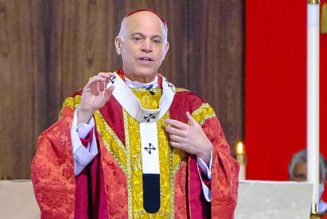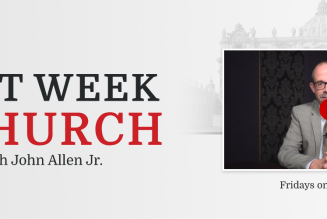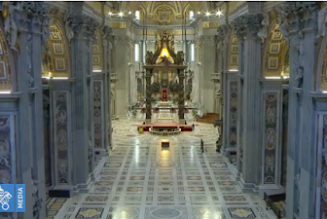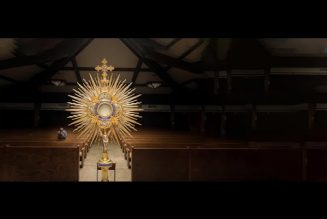By Phil Lawler ( bio – articles – email ) | Sep 09, 2022
Well, we dodged a bullet again. So if you are confident in our ability to keep dodging bullets, you can relax. I’m not so confident.
The German bishops narrowly defeated a statement that would have put them on record in favor of a radical change in Church teaching on sexuality. Should we view yesterday’s vote as a victory for orthodoxy, a reassuring affirmation of unity within the universal Church? Or was it merely a speed-bump on their Synodal Path toward schism?
The latter, I’m afraid. Because:
- Bishop Georg Bätzing, the president of the German bishops’ conference, and Cardinal Reinhard Marx, the most influential member of the German hierarchy, both expressed disappointment with the result.
- A majority of the German bishops endorsed the radical statement; as did more than two-thirds of the lay delegates involved in the Synodal Path. It failed only because the rules required a two-thirds majority among the bishops. And it fell just five votes short of that standard.
- Irme Stetter-Karp, who co-chaired the assembly, strongly suggested that some bishops who voted against the statement actually supported it. In her view, presumably they were “not prepared to voice their opinions” for fear of Vatican disapproval.
- Having failed to approve the one radical statement—in a vote that prompted angry demonstrations on the convention floor—the Synodal Path went on to suggest a reconsideration of ordination for women, and to approve “Eucharistic hospitality” for Protestants.
- And perhaps most telling, Bishop Bätzing announced that he plans to introduce the controversial statement—approved or not—to next year’s meeting of the Synod of Bishops. He said that the failure to approve the document proved that “synodality has not gone far enough.”
Every report that I have seen on the German bishops’ vote implied that the call for radical change fell short this time, but would probably be approved if it came up for a vote again. So if this is a victory for orthodoxy and unity, it is only a temporary victory: a short respite in a continuing battle.
Bishop Bätzing’s statement is particularly telling, because he argues that the statement would have won approval if German Catholics had a proper understanding of “synodality,” and he will bring that argument to the October meeting of the Synod—which, you will recall, is devoted to the topic of synodality.
Most of us have difficulty understanding exactly what “synodality” means. Here Bishop Bätzing offers us a useful clue. Synodality apparently means that a small cadre of Catholic activists—in a country where Church attendance is in freefall and hundreds of thousands of Catholics are formally renouncing their faith—should be allowed to lead the universal Church, changing fundamental moral and doctrinal tenets that have stood unchallenged for centuries.
Does that sound absurd? Yet Bishop Bätzing sounds confident, and with reason. Pope Francis, in his many calls for synodality, has said nothing that would clearly contradict the German bishop’s notion. In his mild rebuke to the German bishops’ Synodal Path, the Pontiff did not scold them for undermining the faith; he only cautioned them against moving too fast, without approval from the universal Church. Bishop Bätzing seems hopeful that such approval will be forthcoming from the Synod of Bishops. If Pope Francis disagrees, he has not said so.
Nor have many other bishops called their wayward German colleagues to account. A few prominent German prelates have warned against the centrifugal force of the Synodal Path: Cardinal Müller comes to mind, and more surprisingly, Cardinal Kasper. A scattering of other bishops, from different parts of the world, have raised the alarm about the German experiment.
But for the most part the champions of orthodoxy are silent. Apparently they are more concerned about preserving the façade of unity than their progressive German counterparts. Or perhaps they are hoping to weather the controversy, to ride out the storm. Listen to the progressive prelates, and you will conclude that acceptance of the radical agenda is only a matter of time. Listen to the more conservative bishops (or should I say listen for the conservative bishops), and you hear no rebuttal.
Stetter-Karp would have us believe that some German bishops approved of the statement on sexual ethics, but were afraid to say so. But does anyone really believe that the Vatican would punish bishops who take such public stands in favor of change? All the available evidence suggests otherwise; under the leadership of Pope Francis, the Vatican is more likely to reward them.
The German bishops’ Synodal Path has been the most conspicuous force for radical change, but in preparation for the worldwide Synod meeting, several other episcopal conferences have approved statements that point in the same direction. Next October in Rome there will be a determined offensive, launched by progressive Catholics, championed by the mass media, designed to bring about a radical change in Church teaching on sexuality. All the momentum is in that direction. If faithful, orthodox Catholic bishops plan to defend the perennial teachings of the Church, silence will not suffice.
Sound Off! CatholicCulture.org supporters weigh in.
All comments are moderated. To lighten our editing burden, only current donors are allowed to Sound Off. If you are a current donor, log in to see the comment form; otherwise please support our work, and Sound Off!

Join Our Telegram Group : Salvation & Prosperity





![A writer, raised by atheist parents, reflects on the brilliance of ‘A Charlie Brown Christmas’ [you may hit a paywall here, but it’s well worth reading]…](https://salvationprosperity.net/wp-content/uploads/2021/12/a-writer-raised-by-atheist-parents-reflects-on-the-brilliance-of-a-charlie-brown-christmas-you-may-hit-a-paywall-here-but-its-well-worth-reading-327x219.png)



